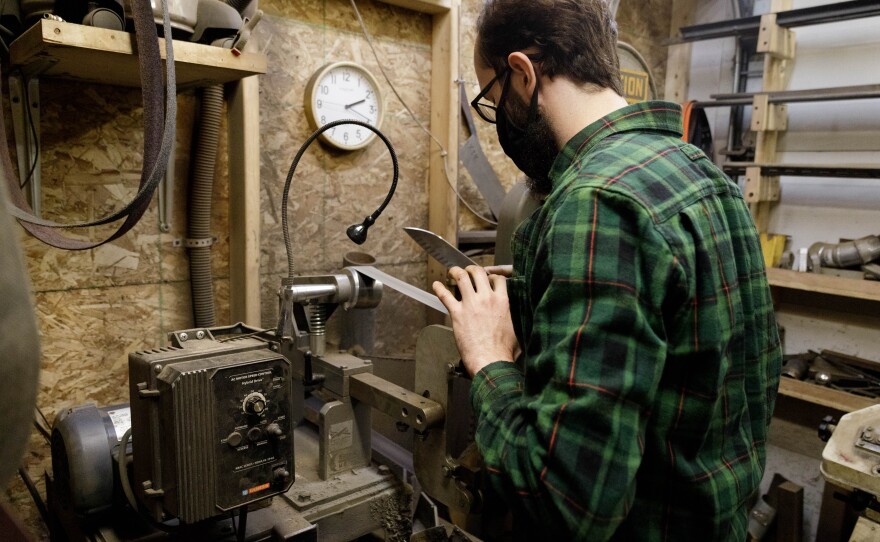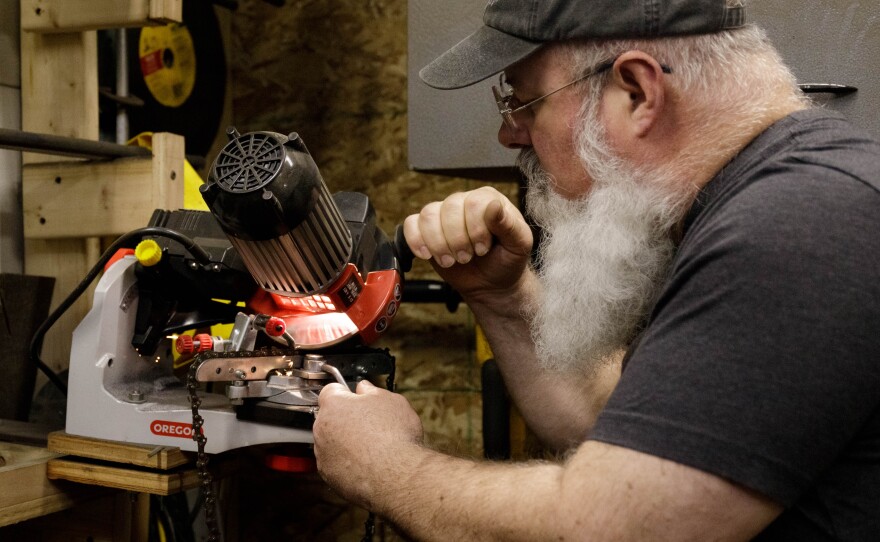As Taylor Mathews lit the forge in his family’s metalworking shop in rural Bloomington, just behind him was an anvil from the ’80s. The 1880s.
Taylor, 22, was surrounded by tools that are decades older than he is.
Time is a funny thing in this workshop. That's one of the things Taylor likes about what he does.
“Knives and edged instruments have built the world,” Matthews said. “They’ve always been used, and you walk into a history museum and there’s masterful pieces of work that were also functional. Knives and swords and things like that.”
Taylor and his father, Bill, have used old skills to create a new business, called the Edge of Normal Workshop. Sharpening has been their (easily cut) bread and butter. But Taylor is now taking them in a new direction.

Taylor is a chef by trade. The pandemic decimated the restaurant business—and Taylor's livelihood. He has used his extra time this past year to build up the knifemaking side of the business.
It turns out, chefs can become really good knifemakers.
“When you go into a restaurant and have to cut vegetables for 10 hours straight, you get to know what you need,” said Bill Taylor.
So what do you need? What separates a high-quality knife from something you pick up for $19.99 at Walmart?
High-end knives are comfortable to hold. They keep their edge longer. Thousandths of an inch make the difference.
“The geometry of the blade is extremely important,” Taylor said. “When it comes to, say, a kitchen knife, you’re cutting through food. Does the knife have to force its way through? Because you can have a knife that’s razor sharp, but if the overall geometry of the blade is not quite right, it won’t feel as sharp because you have to work against a different part of the blade.”
They've got all the tools in their workshop to achieve that precision. That includes a woodworking area to get the handles just right.
“We’ve shipped knives that we’ve build in-house to 35 different countries,” Taylor said.
The most popular international item is a traditional sgian-dubh—the knife tucked into a sock by someone who wears a Scottish kilt.
They get custom orders too, like the woman in Seattle whose husband has really big hands and didn't like using her knives.
“I was able to say, OK, he’s gonna want this handle to be another half-inch longer, a quarter-inch longer here, maybe change this here. Because it’s custom for him,” Bill said.
Once you make a knife, you have to keep it sharp.
Bill learned how to sharpen out of necessity. His day job is musical instrument repair, and he had to teach some violin technicians how to sharpen. So he learned how to do it himself.
Their customers include a lot of restaurants and home cooks who need sharp knives, and crafters who want sharp shears.
But they've done it all. Chainsaws. Woodchipper blades. A flooring company's cutter.
“We really can sharpen most everything,” Taylor said.
Bill learned how to make stuff from his own father, who was the first in his family not to go into farming. He became a machinist instead. Then Bill passed it down to his own sons.
It's about loving the work, not just the end result. Taking something from idea or raw material to a finished product.
“Sometimes I’ll sit at the bench and just be working on something. And next thing you know and it’s three hours later. You were just completely involved in that process,” Bill said.
During a WGLT visit to the shop, the father-and-son team was quick to point out safety precautions, including goggles. They play with a lot of fast-moving metal and heat, and injuries happen.
Bill said he burns himself every time he lights the forge. But nothing that has required stitches since he was a kid.
Taylor once sharpened his own ax and then scraped the back of his hand on it, every so gently.
“The doctor who was stitching me up asked me how I cut myself,” Taylor said. “I said, ‘It was an ax.’ She said, ‘That’s a cleaner cut than most kitchen-knife injuries I see.’”

Taylor is an Eagle Scout. Those organizational and leadership skills come in handy when it's time to run the business side of the business. Because they do want to grow.
Chefs and hair stylists don't like losing their instruments for very long. So they're trying to raise money for a truck with a bunch of gear inside.
“So that we can show up at a restaurant and walk in, take their knives, go out to the truck and sharpen them, bring them back, and drive away. We’re here and gone in a short amount of time. And they have a fresh set of knives to use,” Bill said.
Edge of Normal Workshop also wants to get a spot at farmers’ markets. And the Boy Scouts in them are drawn to teaching. They want to do more classes at their shop.
Taylor said there's a yin and yang to his life.
“It’s a little but funny that my two paths that I followed—cooking and bladesmithing—are kind of opposites,” Taylor said. Cooking, where you can spend all day on one thing and it’s gone in five minutes. But you come out to the shop, you can build something that can be around for 100 years or more and still be useful.”
There's no subscription fee to listen or read our stories. Everyone can access this essential public service thanks to community support. Donate now, and help fund your public media.





